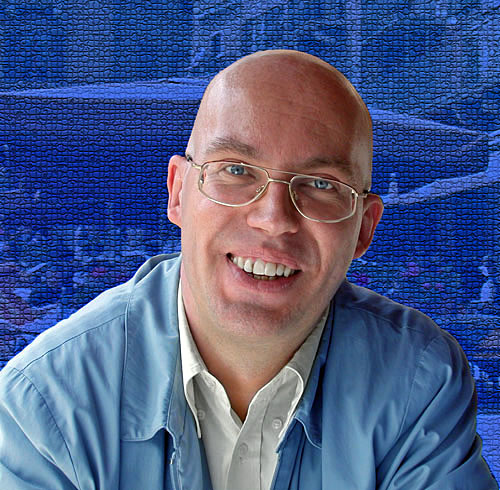A recent post, “Gerhard Kittel Built a Theological Foundation for the Nazis,” generated an unusual thread of comments, initiated by one of our readers, Peter Millward.
In that thread, my friend and colleague Scott Allen linked an article in WORLD magazine in which the interviewer asks German paleontologist Günter Bechly, “What do you think of the link scholars have made between Darwinism, 19th-century social Darwinism, and the rise of 20th-century fascism?” Bechly answers:

It is certainly not simple causation, but a certain mindset combined with a rejection of human dignity leads to atrocities. This is true in Nazism, in Soviet gulags, and now in North Korea. If humans originated from the animal realm by a purely unguided process, there is no real reason in nature to treat humans differently from stones. It’s just a different aggregate of atoms. But the connection is not simple: Darwin wouldn’t have been a supporter of Nazi Germany.
It’s hard to argue with Bechly’s conclusion that evolution favored the rise of the 3rd Reich. We see that same Social Darwinism in Margaret Sanger’s founding of Planned Parenthood in 1921. We see it in 2019 in Planned Parenthood and the abortion industry in the US. They justify abortion on demand at any stage of pregnancy, even at the moment of birth, even after the baby is born. We have crossed the line from killing preborn children to killing newborn children.
Where was the church?
We must ask, where was the church in Germany in the 1920s? Certainly the church was there. Christians were religious and faithful in attending church services. But they were dualistic. They suffered from the sacred-secular divide. The “secular” side of the church was swept up by the racist tide promoting the superiority of the German race, and the victimhood language of Germany after Versailles. They were largely responsible for Hitler’s rise to power.
Why do I say that? Rather than opposing the spirit of the age, they were swept up in it. Instead of defending the biblical worldview, they allowed toxic ideas, becoming dominant in the culture, to seep into the church. Instead of affirming that all men are created in the image of God, the church pushed the Social Darwinist concept of Lebensunwertes Leben, “life unworthy of life.” Jews, homosexuals, physically and developmentally disabled people were not worthy of life. This is Darwinian survival of the fittest in all its glory. Today, Western nations are bragging on how few Down Syndrome babies they have. Why? Because public policy drives abortion of Down babies.
When the 3rd Reich took power, the church largely supported the party. Many in the German church were members of the Nazi movement. Some were Nazi leaders. Even the Confessing Church, with few exceptions, acquiesced to the Nazis. The German church largely denied the humanity of Jews and adopted the Nazi standard for racial purity: “life unworthy of life.” Many, if not most in the Confessing Church fought for the dignity of Jews who had confessed Christ but turned a blind eye to the suffering of Jews who were not Christians.
I’m learning much about the church’s collusion in Robert Erickson’s book, Complicity in the Holocaust. Yes, Social Darwinism was one layer that contributed to the rise of Nazism. Nietzsche was another layer. But the complicity of the church was a third.
The Nazis’ evil was countenanced by the church
 Even after the defeat of the 3rd Reich, during the time of the denazification and the Nuremburg trials, when the world was fully aware of what Germany had done, the church was largely in denial. Ericksen writes:
Even after the defeat of the 3rd Reich, during the time of the denazification and the Nuremburg trials, when the world was fully aware of what Germany had done, the church was largely in denial. Ericksen writes:
In response to Allied plans for denazification, the church was simply unprepared to cooperate. No awareness of Christian guilt, no statement of repentance, and no acknowledgment of the suffering of Germany’s victims marked the church’s side of the dialogue.
Ericksen points out that the church defended professed Christians who were part of the Nazi machine but seldom came to the defense of the Jews and other victims of the Holocaust.
These clergy vouched for the good character of specific individuals, despite their past membership in the Nazi Party, the SS, or other Nazi organizations. Reference to religious belief or practice often dominated these statements, with the highest value placed on membership in the Confessing Church.
How can this be? How could this criminal behavior be justified? Even the “rebellious” Confessing Church was caught up in the spirit of denial of Christian complicity in the Holocaust.
[T]his practice rested on the claim among Christians in Germany – and the hope among Christians abroad – that religious values could be seen as a natural counterweight to Nazi ideas and policies. Clear-eyed honesty would have shown otherwise. However, Germans had little desire to be clear-eyed or honest in the postwar period, and many in the Allied camp, especially in Britain and the United States, defaulted to their own sense that Christian values and Nazi beliefs would have been impossible to reconcile.
Christians on Sunday, Nazis on Monday
Christians in Germany and in the USA and Britain assumed that Christian teaching and values would have acted as a counterweight to the spirit of the age. The thought was that Nazi beliefs and Christian beliefs are incompatible.
Certainly Nazi beliefs are incompatible with biblical teaching. But the Sacred-Secular Divide (SSD) permits Christ-followers to live in two ways: good Christians on Sunday, and Nazis on Monday. This was the cultural soil in Germany that nurtured the 3rd Reich. Most German Christians explicitly supported the Nazis, most of the church among the Allies turned a blind eye.
If the church were to have consciously functioned from the biblical worldview, she would have been not merely the counterweight to the Nazi spirit, but, with the power of God, she would have reversed the Nazi tide. A divided mind yielded a divided life.
In that day, the American and British churches were blind to what was going on. They could not imagine that the church in Germany could be complicit in the Holocaust. Growing up, I could not imagine it. When I finally saw the depth of the church’s involvement, I could not understand how it happened. Now I understand through a glass darkly. There is no excuse for not seeing, understanding and promoting in word and deed a different life.
What Nazis does the church condone today?
But what are the implications for the church at the beginning of the 21st Century? If we continue to live with two minds, we will be complicit in the spirit of the modern/postmodern age.
The abortion industry is the child of the eugenics movement and Social Darwinism of 100 years ago. Too many don’t see this as clearly as they should, and don’t give it the priority it deserves.
Today’s Social Justice ideologues have much in common with the victim-obsessed, race-obsessed, grievance-obsessed post-WWI German mentality. Today’s SJ warriors, like yesterday’s Nazis, promote victimology and a race-based grievance mindset. They are steadily descending into Nazi-like, remorseless power tactics as well.

Today’s safe spaces on university campuses mimic the 1930s book burning by German youth and universities. The violence of the modern fascism of the right (white supremacists) and left (ANTIFA) is rooted in the same ideology of Hitler’s Brown Shirts. Their tactics are borrowed from the Brown Shirts.
What will today’s church do? Will we think clearly and honestly and function as a counterweight to the postmodern spirit of our age? Will we gratefully apply the profound gift of the Judeo-Christian worldview and exhibit love and speak the truth to today’s challenges?
Here’s one lesson we need to draw from the history of the church in Nazi Germany: It is very difficult, and very important, to stand against a powerful cultural zeitgeist—the spirit of the age. We are influenced by it far more than we realize.
The church is still vulnerable
Today we still suffer from the SSD. We are still double-minded. We still compartmentalize our faith. This makes the church, and the culture, even more vulnerable to profoundly non-Christian ideas. We are tempted to make Christian-sounding arguments for non-Christian beliefs, as did the German church.
We need to be keenly aware of the cultural zeitgeist. The temptation to find common ground (and ignore important distinctions) is very strong, particularly in a climate that emphasizes being “relevant” and “seeker-sensitive.”
The Left is advancing the zeitgeist with tactics of shaming, bullying and name-calling. It is hard to stand up against this if we are not sure about our principles. We are tempted to keep our heads down. To keep quiet. We must resist this temptation if we would prevent toxic, deadly ideas from overtaking the culture. We must take a stand for the truth no matter the cost, and fully engage in the battle of ideas, using the weapons of spiritual warfare—truth, love, grace, civility, gentleness, forgiveness, prayer, and reliance on God’s Spirit.
– Darrow Miller







6 Comments
Peter Millward
March 5, 2019 - 9:59 pm……….recent posts about the nazis and theology have been provoking a rethink……I am still processing. The question about Kittel has been surprising, but the question would he approve of the holocaust had he seen evidence early on? Or he just could not have imagined the kind of evil he was caught up in? In the past I remember seeing a film documentary when the death camps were liberated, at one of them the soldiers of the Allies marched the citizens of a local town to go and see inside the local concentration camp. The mayor and his wife of one town after their visit went home and committed suicide. So we are trying to fathom how best to prevent evil…..and yet today evil already is permitted with abortion and even the killing of babies who are born. …vast questions to weigh…because the scale of acceptance by the public is vast. How to confront it and prevail? how to change the mindset of the public? How to fan the flame of public conscience? I share some sketches at a link http://pictureswithamessage.com/99/100.htm done in year 2000. These deal specifically with questions about what happened with past genocide of Jewish people…….the flame of conscience is targeted and snuffed out, as I look at them again I ponder where I would put Kittel……Also a boardgame – .Philosophy……but the question today how is the flame of conscience? and how do we make it burn brighter?
admin
March 6, 2019 - 6:48 amPeter
We are having a artists workshop in Bogota, Colombia for young Christians who artists from Latin America. It would be good for us to reflect on the questions you have raised.
Peter Millward
March 6, 2019 - 5:41 pmThankyou….. yes, it would be good to see how young Christians in Latin America will process the questions…….The question will also show how is the flame of conscience burning in them? How is it illuminating their art? If they look at the last 5 years of work they have done…..What is it saying? Does it show a flame of conscience burning? what does it reflect? Does it reflect a broken heart about things that break the heart of God? Do they see their gifting through the eyes of God?…that the giftings they have, Jesus is worthy of totally and God is looking for a return?…..for the Lamb to receive the reward of His suffering……I am writing as a 59 year old artist….In 10 years time, God willing I will be 69 yrs……in 20 years time, God wiling, I will be 79 yrs! – time is short. What did I do with the gifts God gave me?
admin
March 7, 2019 - 5:22 amPeter, you have articulated some very important questions here. Do not know if you know Yarley Nino. Yarley is from Colombia and had lead the YWAM base in Puerto Rico for some 30 years. She is now coordinating the ADN movement in the Spanish speaking Americas. She is the one who is the visionary behind the Artists Workshop at the end of July.
Perhaps you can pray about coming to the workshop. It would be great to have your participation.
Peter Millward
March 8, 2019 - 6:45 pmThankyou for the invite! yes…..we will be definitely praying!
admin
March 9, 2019 - 6:02 amYes, do pray and see how the Lord might lead you.